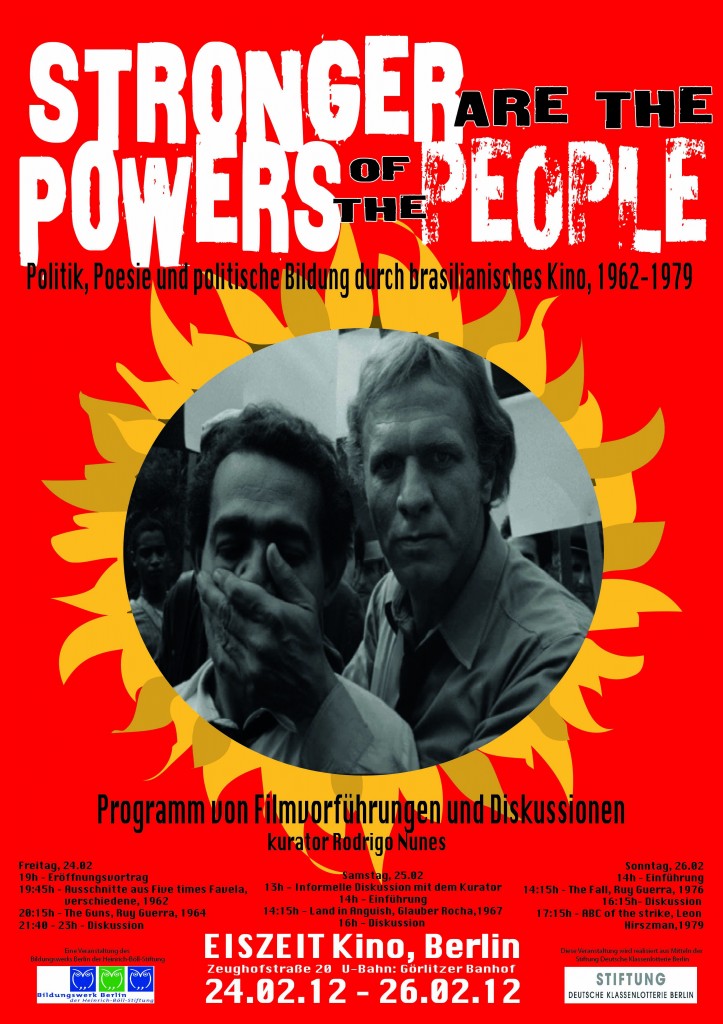Dutch translation of the Turbulence Issue 1 interview with Todd Hamilton and Nate Holdren, ‘Compositional Power’
 In Issue 1, published in June 2007, Turbulence carried an interview with IWW members, Todd Hamilton and Nate Holdren, titled ‘Compositional Power‘. We are pleased to report that it has now been translated and published by the Dutch collective, Hydra Ensemble. It is available online here.
In Issue 1, published in June 2007, Turbulence carried an interview with IWW members, Todd Hamilton and Nate Holdren, titled ‘Compositional Power‘. We are pleased to report that it has now been translated and published by the Dutch collective, Hydra Ensemble. It is available online here.
The translation was published in Issue 3 of Hydra (October 2012), which can be read in full here.
Turbulence workshop, May 30, Nottingham – “Rethinking the Realistic: Social Movement and Struggle in the Current Crisis”
 ‘How deep do the current political, economic, ecological and other crises run?’, ‘Why do the range of remedies on offer not seem fit for purpose?’, ‘What roles might recent movements – from the Arab Spring to #Occupy – play in finding ways out of this impasse?’, ‘What are the main challenges movements are confronted by, and how can they best be approached?’ These are just some of the questions Turbulence, a collective of activist-scholars, are exploring in their current research project. At this workshop – open to interested students, faculty and activists – some tentative answers will be presented for discussion.
‘How deep do the current political, economic, ecological and other crises run?’, ‘Why do the range of remedies on offer not seem fit for purpose?’, ‘What roles might recent movements – from the Arab Spring to #Occupy – play in finding ways out of this impasse?’, ‘What are the main challenges movements are confronted by, and how can they best be approached?’ These are just some of the questions Turbulence, a collective of activist-scholars, are exploring in their current research project. At this workshop – open to interested students, faculty and activists – some tentative answers will be presented for discussion.
The workshop is in four parts: ‘Nature and Causes of the Crises’; ‘Planning for the Anthropocene’; ‘Rethinking Realpolitik’; and, ‘A Politics of Problematics’. Each begins with a 15-minute input from a different member of the Turbulence collective, followed by around 35 minutes of open discussion.
Hosted by the Centre for the Study of Social and Global Justice (CSSGJ) at the University of Nottingham.
Wednesday 30 May, 12.00 – 16.00.
B2, The Hemsley, University of Nottingham. (Map here.)
www.turbulence.org.uk | http://www.nottingham.ac.uk/cssgj/
‘Stronger are the powers of the people’: Film and Discussion Event curated by Turbulence Editor, Rodrigo Nunes, Berlin 24-26 February
The following event has been curated by Turbulence editor, Rodrigo Nunes, and will take place in Berlin from 24-26 February.
‘Stronger are the powers of the people’: politics, poetics and popular education through Brazilian cinema, 1962-1979
EISZEIT Cinema, Berlin
24.02.12 – 26.02.12
A programme of film screenings and debates looks at Brazilian films from 1962-1979 in order to illuminate a rich time in the country’s life. Examining the period’s debates on the political valence of cultural work and the relations between art and politics serves as the starting point for a collective enquiry into the problems that animate artistic and political practice today – and what the past can teach us about them. The programme is curated by Brazilian philosopher Rodrigo Nunes.
‘Stronger are the powers of the people’: politics, poetics and popular education through Brazilian cinema, 1962-1979 uses six classic Brazilian films from the 1960s and 1970s as a guiding thread across the politics and culture of those years. While most of it was lived under a military dictatorship, the period was also one of the richest in the country’s cultural life. Then, the exploration of the intersections between art and politics were not only in an intense dialogue with what was taking place abroad, but also producing entirely original proposals: it was the time of the Centros Populares de Cultura (CPCs, or Popular Culture Centres), of Paulo Freire’s Pedagogy of the Oppressed, of Augusto Boal’s Theatre of the Oppressed, of Neoconcretism, Tropicalismo, and Cinema Novo. Together, these experiments worked out solutions to a number of questions that are still pertinent today: what is the relationship between ‘popular’, ‘mass’ and ‘avant garde’ cutlure? what is the relationship between class and aesthetics? how do form and content relate in political art? what is (and should be) the professional and political status of engaged artists.
The films play the crucial role of being starting points for debate, but the goal is above all to generate a collective rethinking of the relationship between art and politics that can use those experiments from almost half a century ago to tackle the problems that animate political and artistic practice in the present.
The event consists of a film programme, with an opening lecture and an open debate (with invited respondents) at the end of each film. The films included are:
· segments from Cinco vezes favela (Five times favela), various directors, 1962
· Os Fuzis (The guns), Ruy Guerra, 1964
· Terra em transe (Land in a anguish), Glauber Rocha, 1967
· Dragão da Maldade contra o Santo Guerreiro (Antônio das Mortes), Glauber Rocha, 1969
· A Queda (The Fall), Ruy Guerra, 1976
· ABC da greve (ABC of the strike), Leon Hirszman, 1979-91
The programme:
All films are in the original Portuguese with English subtitles.
Opening and introductory talks as well as discussions will be held in English
Friday
7pm – Opening talk: ‘Stronger are the powers of the people’ (45 minutes)
7.45pm – Screening of segments from Cinco vezes favela (Five times favela), various, 1962, 30 min
8.15 – 9.40pm – Screening of Os Fuzis (The guns), Ruy Guerra, 1964, 80min
9. 40 – 11.00pm – Discussion
Saturday
1pm – Informal discussion with the curator
2pm – Introductory talk
2.15pm – Screening of Terra em transe (Land in anguish), Glauber Rocha, 1967, 106 min
4pm – Discussion
4.45pm – End of day
Sunday
2pm – Introductory talk
2.15pm – Screening of A Queda (The Fall), Ruy Guerra, 1976, 120 min
4.15pm – Discussion
5pm – Break
5.15pm – Screening of ABC da greve (ABC of the strike), Leon Hirszman, 1979-90, 85 min
6.40pm – End of day
Film Synopses
Cinco vezes favela (Five times favela), various authors, 1962
The only film the Popular Culture Centre (CPC) brought to completion, it comprises five episodes directed by Miguel Borges, Marcos Farias, Joaquim Pedro de Andrade, Caca Diegues, and Leon Hirszman, and was responsible for a split between the CPC and the cinema novo group. Some of the key figures in the CPC reportedly considered the film both a commercial and a political flop, and filmmakers such as Diegues and Arnaldo Jabor (though not Hirszman) left after decrying a narrow, instrumental conception of the relation between aesthetics and politics. With a cast including many of Augusto Boal’s colleagues from Teatro de Arena (and, most notably, CPC founder Oduvaldo Viana Filho), it captures a group of young filmmakers grappling with the same problems that were being felt in other areas – how to create a form adequate to the specificity of Brazilian content? How to do so in a way that reaches beyond a middle-class audience, and plays a role in the transformation of Brazilian society from below? What is popular culture, and how must the artist deal with it? – while working through a host of influences, from Russian revolutionary cinema to neo-realism. Joaquim Pedro de Andrade’s segment Couro de gato (Catskin) was included in a list of the 100 best shorts of all times selected by the Clermont-Ferrand Festival.
Os Fuzis (The guns), Ruy Guerra, 1964
One of the greatest achievements of the first crop of cinema novo – alongside Nelson Pereira dos Santos’ Vidas secas (Barren lives) and Glauber Rocha’s Deus e o Diabo na Terra do Sol (Black God White Devil) (1964) –, it showcases many of the period’s defining traits: the rural Northeastern setting, the use of location, natural light and non-professional actors. At the same time, in its plot about the existential and moral crises undergone by a group of soldiers sent to a small town to stop the starving victims of the draught from attacking a food warehouse, it provides in arguably the clearest way the keys to reading some of the political limitations of cinema novo at this stage. It won the Silver Bear at the Berlin Festival.
Terra em transe (Land in anguish), Glauber Rocha, 1967
Part roman à clef about the Joao Goulart government and the 1964 military coup, part schematic description of the dynamics of the post-colonial world, part baroque allegory about the destiny of Latin America, part gauntlet thrown at the right and left of post- coup Brazil: one of Rocha’s most celebrated films, it finds the effects of his ‘epic-didactic’ cinema all the more effective because its target is much clearer. A whole generation at a crossroads appears in the vacillations of the main character, his multiple allegiances to social transformation and to his own class, to aesthetics and to politics, to utopia, the heat of the struggle, and his professional situation as a hired pen. The choice for armed struggle, which the film suggests in ambiguous fashion, was already brewing as it was produced. Nominated to the Palme d’Or at Cannes, best film at the Havana Film Festival.
O Dragão da Maldade contra o Santo Guerreiro (Antônio das Mortes), Glauber Rocha, 1969
Rocha’s first international co-production, first film in colour, and first using direct sound. He would often refer to it as ‘my western’, but, despite some nods at John Ford and Howard Hawks, it is clear that the oeuvre in question here is above all his own. Like a revision of his two earlier films that relaunches its questions, but also seems to run out of answers, it already points towards some of the procedures (such as the long, semi-improvised takes) that would characterise his work in the exile that immediately follows it. The plot finds Antônio das Mortes, the gunman hired by landowners to kill cangaceiros (highwaymen), brought out of retirement for one last job which, once executed, causes him to question the side on which he has fought over the years. Won best director and a nomination to the Palme d’Or at Cannes.
A Queda (The Fall), Ruy Guerra, 1976
An accident at a construction site, resulting in one death, sets one worker off on a struggle for justice that exposes the mechanisms of exploitation and the class relations of a country that had undergone one decade of fast-paced ‘conservative modernisation’ at the hands of the military. As a sort of sequel to the classic The Guns (1964), following the fate of those characters as they move from enforcers of exploitation to exploited, it offers more than a snapshot of the period: the correspondent time lapses in fiction and reality capture the passage of a chunk of Brazilian history between the two films, and, therefore, also the transformations in cinematographic approaches to the social and political between the two moments. Equally daring in content and form, and in the originality of the adequacy of one to the other, it won the Silver Bear at Berlin.
ABC da greve (ABC of the strike), Leon Hirszman, 1979-91
While preparing the cinema version of Teatro de Arena’s groundbreaking 1957 play Eles não usam black tie on location in the ABC (the auto industry belt around São Paulo), Hirszman has the opportunity to document the most important strike in over a decade of Brazilian history. The latter would become a catalyst and a convergence point for the opposition to the military regime, intellectuals, artists, returning exiles, eventually leading to the creation of the Worker’s Party – whose biggest leader, Lula, was the president of the metalworkers union who led the strikes. Running into problems with the regime’s censorship because of the material, Hirszman dies in 1987 leaving the film unfinished until 1991, when his two daughters and son eventually release a final cut. The narration and text are provided by Ferreira Gullar, poet, who was president of the CPC at the time of the military coup.
This event is organised by the Heinrich Böll Foundation’s Educational Institute in Berlin. It is made possible through the funding of the Stiftung Deutsche Klassenlotterie Berlin.
The event is free.
Venue: EISZEIT Kino Zeughofstr. 2010997 Berlin (www.eiszeitkino.de)





